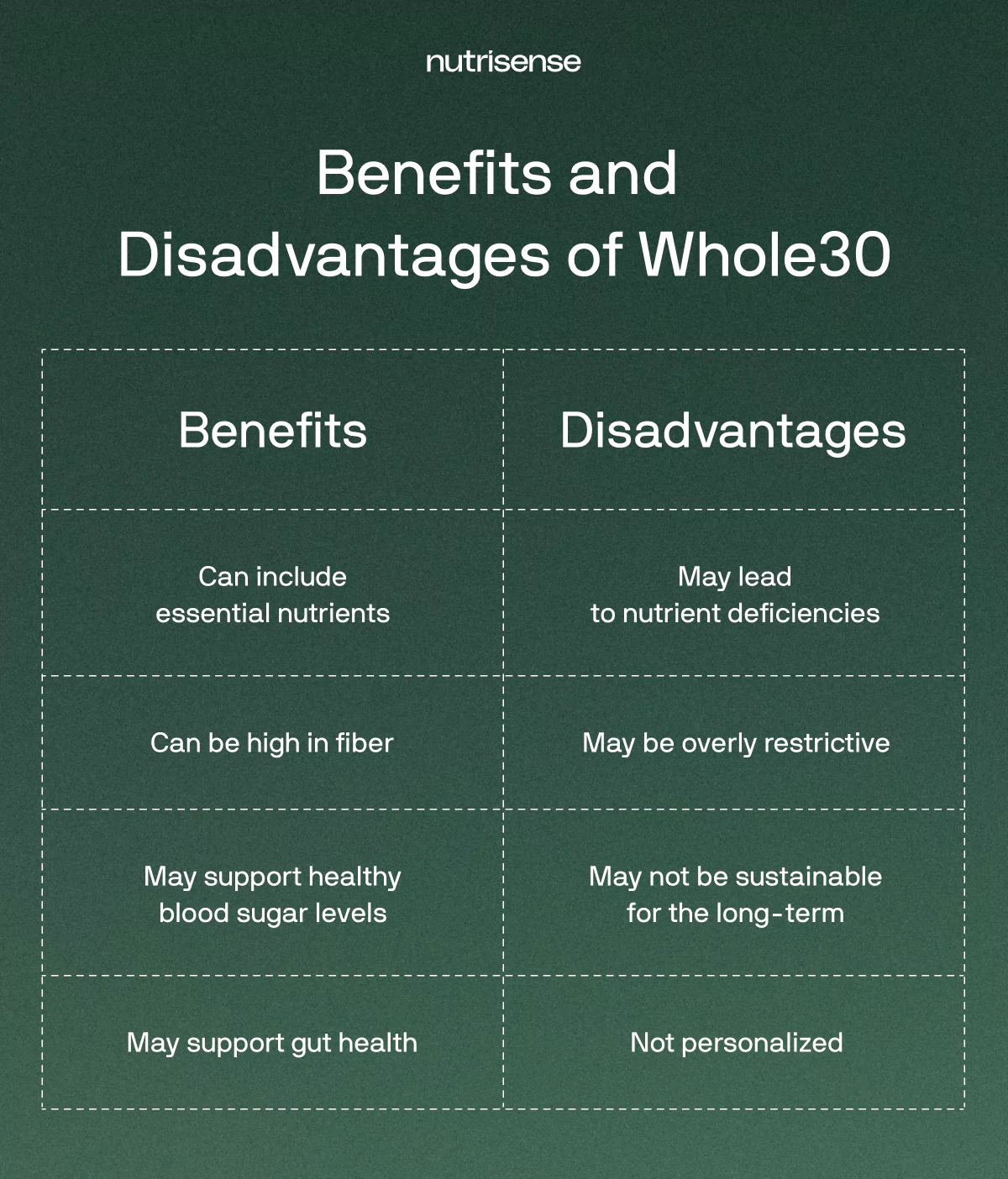The Whole30 Diet Uncovered: Does It Deliver Real Results?

Key Takeaways
If you've been looking into dieting strategies to help you reach your health goals, you may have heard of the Whole30 diet. This elimination diet has been promoted as a way to heal your gut, lower inflammation, or decrease risk for chronic diseases such as type 2 diabetes—but are these potential benefits proven?
While some people may have anecdotally found success on the Whole30 program, its popularity doesn’t necessarily make it the right diet for you. In this article, we’ll take you through:
- How the Whole30 works
- What benefits and potential downsides it may have
- What research has shown about this eating plan
What Is the Whole30 Diet?

The Whole30 diet is a short-term elimination diet that is advertised as a whole-body health reset. It emphasizes eating whole foods and requires giving up all processed foods, added sugars, and food additives. This restrictive diet also asks you to avoid certain food groups that could be considered inflammatory, such as grains, dairy, soy, and legumes.
Following a 30-day elimination phase, you’ll reintroduce foods one at a time, once every three days or more, to understand your response to certain foods going forward.
Guidelines of the Whole30 Diet
The elimination phase requires strict adherence, so if you’re considering this diet, you may need to spend a few days prepping your kitchen. Then, for the next 30 days, you’ll need to stick to the following rules:
Foods to Eat on the Whole30 Diet

Foods allowed during the Whole30 elimination phase include:
- Whole foods: Stick to consuming real, unprocessed foods.
- Meat and eggs: Poultry, beef, pork, eggs, and seafood are allowed. If you’re vegetarian, there is a Plant-Based Whole30 that allows certain protein sources that otherwise would be excluded, mostly legumes such as lentils, peas, and soy.
- Vegetables: Include a wide range of these, both starchy veggies (such as sweet potatoes and root vegetables) and non-starchy vegetables (think leafy greens).
- Fruits: Enjoy fresh fruits in moderation. While these contain nutrients, certain fruits are also high in sugar.
- Fats: Use healthy fats for cooking and drizzling such as olive oil, coconut oil, and avocado oil.
- Nuts and seeds: Consume nuts and seeds in moderation.
- Herbs and spices: Use common kitchen herbs and spices to flavor your dishes, with added health benefits.
- Coffee and tea: Unlike some elimination diets, the Whole30 allows black coffee. Unsweetened tea of all kinds is also acceptable.
Foods to Avoid for 30 Days

Foods not permitted on the Whole30 include:
- Sugar: Limit all forms of added sugar, including everything from honey to ice cream, maple syrup, fruit juice, and artificial sweeteners.
- Grains, including non-gluten grains: All grains, including wheat, alternative flours like sorghum, oats, rice, corn, barley, rye, wheat berries, farro, amaranth, buckwheat, and quinoa are not allowed under this diet.
- Dairy: Exclude dairy products, including milk, cheese, and yogurt.
- Legumes: Legumes like beans, lentils, chickpeas, soy, and peanuts are all avoided on this diet, with the exception of green beans and peas.
- Alcohol: Alcohol is not allowed.
- Processed foods, baked goods, and “junk foods”: All processed foods are also off-limits.
- MSG, sulfites, and carrageenan. Avoid these additives commonly found in processed foods.
Additional Guidelines
As you go through the program, these are some additional guidelines provided by the program:
- Read labels
- Don’t take cheat days
- Focus on mindful eating
- Cook at home
- Stay hydrated
This program recommends being vigilant about reading food labels, since many products can have hidden ingredients. This can be helpful, since according to the diet’s restrictions, consuming an item on the “avoid” list, whether intentionally or by accident, can mean you’ll have to start over.
Eating slowly and mindfully can help you to pay attention to your body's hunger and fullness cues, while preparing meals at home can also allow better control over ingredients. Drinking plenty of water throughout the day is another important factor, and these nutritionist-recommended hydration strategies can be helpful if you have trouble staying hydrated.
What Is the Controversy with the Whole30 Diet?

If you ask healthcare providers including doctors and registered dietitians whether doing the Whole30 is a good idea, you’ll likely receive hesitant responses. This mainly stems from the fact that there is currently very limited scientific evidence to support the claims that proponents of this diet stand behind.
It’s also important to consider that Whole30 is not a personalized diet plan, and to identify and address the root cause of metabolic health concerns or gut issues, a personalized approach to healthy eating with a qualified nutritionist is often necessary.
Benefits and Disadvantages of the Whole30 Diet

While there may be some controversy behind this diet, that’s not to say the Whole30 is without any potential benefits. In fact, some people report positive effects ranging from decreased anxiety and fewer migraines to better energy levels and more restful sleep.
So what are the potential benefits and risks associated with the Whole30 diet?
Potential Health Benefits
- Can include essential vitamins and minerals: One benefit of this diet is it can help you to focus on nourishing your body with whole, minimally processed foods which are filled with essential vitamins and minerals.
- Can be high in fiber: While you won’t be eating grain- or legume-based sources of fiber, you’ll still likely consume plenty of fiber from vegetables, fruits, and nuts, which can have beneficial effects for your metabolic health.
- Can support gut health: Limiting high-calorie and inflammatory foods like sugar, alcohol, and processed foods: in your diet can support better overall health and may even be beneficial for weight loss.
- May support blood sugar regulation: By limiting your intake of refined carbohydrates and putting a focus on whole foods that can be rich in fiber and other nutrients, this diet may help prevent blood sugar spikes for some people.
Disadvantages
The Whole30 is more restrictive than many other popular diets, which isn’t necessarily a good thing. This diet is meant to be a short-term elimination diet—not a long-term weight-loss plan or a way to heal complex health conditions on your own.
Additionally, many elimination-type diets lack the nuance required for assessing individual tolerance to foods longer-term and tend to take an unhelpful all-or-nothing approach to identifying and including (or avoiding) certain foods.
- Potential nutrient deficiencies: While the Whole30 may have certain benefits, you’ll also be missing out on important nutrients that are found in foods like dairy products, legumes, and grains.
- Overly restrictive: If you tolerate foods like grains, dairy, and legumes, you may not need to eliminate these nutrient-dense foods to address your symptoms. And even if you don’t tolerate these foods well, you may not need to eliminate them completely from your diet. Rather, taking periodic breaks and avoiding frequent exposure may be the answer to keeping them in your diet.
- Can encourage eating disorder tendencies: Although the Whole30 is meant to change your relationship to food in a positive way, overly restricting foods can result in unhealthy habits and worsened cravings and reactive binging once the elimination phase is over.
- Not sustainable: If you don’t tolerate one or more “avoid” foods, eliminating those foods and cutting out entire food groups may not be sustainable or even necessary.
How Effective Is the Whole30 Diet?

While many people lose a few pounds or more while doing the Whole30, the creators of the Whole30 state that it is not a weight loss diet. Any pounds lost may be the result of a lower caloric intake and a reduction in sugar or processed foods.
According to Heather Davis, MS, RDN, LDN:
"While the Whole30 diet may offer short-term benefits for some individuals, it's important to recognize its drawbacks. The diet's extreme restrictions can lead to nutrient deficiencies and potentially foster unhealthy relationships with food in the long run. The all-or-nothing elimination philosophy may also not be effective for addressing true intolerances longer-term."
"Instead, following a balanced, sustainable, and more personalized approach to nutrition that includes a wider variety of whole foods with a nuanced tolerance assessment is often a better choice for overall health and well-being."
The Whole30 also doesn’t include a movement component, which is important for weight loss. By focusing on consuming a nutrient-dense whole food diet, but not overly-restricting yourself by eliminating grains, dairy, and legumes, you may observe similar benefits without the downsides.
Do Doctors Recommend the Whole30 Diet?

As Dr. Kevin Huffman, D.O., a board-certified bariatric physician as well as the CEO and Founder of Ambari Nutrition, tells us, “Within the medical community, opinions about the Whole30 diet diverge significantly: some physicians and nutritionists view it as a beneficial short-term reset—designed to cultivate healthier eating habits; others express concern over its stringent restrictions and potential long-term consequences.”
For some, it could provide benefits, as Dr. Jihad Kudsi, MD, ABOM, MBA, MSF, FACS, bariatric surgeon and Chair of Surgery Duly Health and Care Chicago IL says, “The Whole30 diet encourages the elimination of processed foods, added sugars, and artificial additives. This can lead to a diet that's rich in whole, unprocessed foods, which is generally a healthier way of eating. It can also help individuals become more aware of their dietary choices and how certain foods affect their bodies leading to healthier long-term eating habits.”
In his own role as medical practitioner, Dr. Huffman has observed that patients' responses to the Whole30 diet vary significantly, explaining, “Some report heightened energy levels, weight loss and improvements in overall health; others, however, in contrast, experience fatigue, dizziness and even mood swings over the course of 30 days. So, reactions to this dietary regime can be remarkably individualized and divergent.”
At this time, there is limited scientific evidence to support the potential benefits. “Current scientific studies offer only scant evidence: they neither fully support nor refute the purported benefits of the Whole30 diet,” says Dr. Huffman, adding, “Eliminating processed foods and sugars, bolstered by an increased consumption of whole foods–studies show–can instigate weight loss. Moreover, it can also engender other health benefits such as improved digestion and heightened energy levels.
Conversely, a scant number of studies posit this: the extreme eradication of certain food groups (as Whole30 advocates) could possibly instigate nutrient deficiencies and other health issues over an extended period. The stringent rules of the Whole30 diet may also heighten the potential for disordered eating habits' development: a risk underscored by some individuals struggling to reintroduce previously eliminated foods back into their diets—often ingrained with guilt or fear.”
While the Whole30 is more restrictive than many elimination diets, other elimination diets may also be more targeted. For example, the low FODMAP diet is formulated to address specific health concerns. And it may not be sustainable over time, in large part because of these restrictive demands. Dr. Huffman explains:
“The diet's rigid demands and the challenges presented in social situations—where non-compliant foods are served—are difficult to navigate. The Whole30 diet's stringent regulations may also negatively impact one's social activities, especially considering the centrality of food at many social events. The anxiety, derived from having to forgo particular foods, can potentially harm mental health.”
Dr. Kudsi adds, “The Whole30 diet is quite restrictive, eliminating entire food groups such as grains, dairy, and legumes. This can make it challenging to follow and may lead to nutrient deficiencies if not well-planned. It's important once the 30 days are over, to have a plan for transitioning to a balanced and sustainable eating pattern. Also, the diet can be socially challenging, as it may limit one's ability to dine out or participate in certain social events. This can lead to feelings of isolation and frustration”
While there are potential benefits it may offer for some, for most people, meeting with their medical providers and a registered dietitian or nutritionist may be a more effective approach, as they can work with you to define a personalized plan designed to help you to reach your health goals.
So, if you are trying to get to the root of a specific condition and considering the Whole30, consult a doctor or qualified nutritionist to determine if the diet is the right choice for your needs. “What works for one person may not work for another,” says Dr. Kudsi. His advice to anyone thinking about this diet is to:
“Listen to your body and be mindful of how the diet is affecting your health, energy levels, and overall well-being. While the Whole30 can be a useful reset, it's important to adopt a balanced and sustainable approach to nutrition after the 30 days. Reintroduce eliminated foods gradually and maintain a diverse diet. It's essential to focus on making dietary choices that support your long-term health and well-being, rather than quick fixes or extreme diets.”
As Dr. Huffman puts it, “Before initiating this diet, you must evaluate your personal health history: pay particular attention if there are specific dietary requirements or restrictions; consider any background of disordered eating—these factors are crucial. Also, you have to consider the intensity of lifestyle changes required for this diet and ponder its sustainability within your current lifestyle: such a demanding regimen may not be feasible.”
Find the right Nutrisense programto turn insight into progress.
Go Beyond Glucose Data with Nutrisense
Your glucose can significantly impact how your body feels and functions. That’s why stable levels are an important factor in supporting overall wellbeing. But viewing glucose isn't enough. Nutrisense, you’ll be able to learn how to use your body's data to make informed lifestyle choices that support healthy living.
One-to-one coaching
Sign up to access insurance-covered video calls to work with a glucose expert: a personal registered dietitian or certified nutritionist who will help tailor your lifestyle and diet to your goals.
Monitor and measure what matters
With the Nutrisense CGM Program, you can monitor your glucose with health tech like glucose biosensors and continuous glucose monitor (CGM)s, and analyze the trends over time with the Nutrisense App. This will help you make the most informed choices about the foods you consume and their impact on your health.
Find your best fit
Ready to take the first step? Start with our quiz to find the right Nutrisense program to help you take control.




